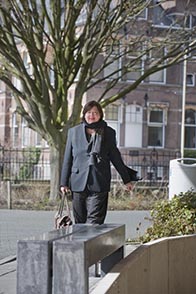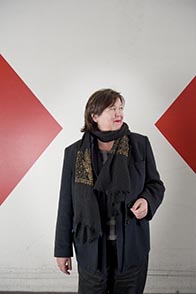‘You have to know more than the opposition’

Ellen ’t Hoen is fighting for better access to essential medication.
The Lancet , the most prominent medical journal in the world, published a plea to tackle the exorbitant prices of new drugs last autumn. One of the authors is lawyer Ellen ’t Hoen, a researcher at the UMCG.
Access to essential medication was until recently a problem confined to developing countries. Now that wealthy countries are also finding it harder and harder to cover the costs of drugs, the calls for change are becoming louder and louder. ‘Health budgets are stretched to the limit, the costs of drugs continue to rise and the power of the pharmaceutical industry is immense. Something has to be done about this’, says lawyer and activist Ellen ’t Hoen.
A perfect example is the liver infection hepatitis C. There is currently a drug on the market that results in a 98% recovery rate within twelve weeks. However, there are still people suffering from this disease and in Ireland there is a long waiting list. ’t Hoen: ‘The catalogue price for this drug is $ 84,000. In Europe treatment costs € 55,000 per patient, despite it costing less than $ 100 to produce the drug. The profit margin is astronomical. The same situation can be found in the UK with a drug for breast cancer. The drug is effective but not cost-effective, so it’s not prescribed.’ ’t Hoen, who has been fighting for better healthcare for over thirty years, has made it her mission to fundamentally change how drug innovation is funded.
DES daughter
If her mother had not been prescribed an untested, dangerous drug, then the pharmaceutical industry would most probably have had one dangerous opponent less to worry about. ‘Actually, drug policy was way outside my sphere of interest. That was until I discovered that my mother had taken DES during her pregnancy.’ DES (diethylstilbestrol) is a synthetic oestrogen. It was prescribed on a large scale after the Second World War to pregnant women in the mistaken belief that it would prevent miscarriages and produce stronger babies. What it actually did was create health problems for the mothers, daughters and sons, and possibly even grandchildren. ’t Hoen’s mother died in 1995 from breast cancer metastases. The drug was only banned for use during pregnancy in 1976. DES daughter ’t Hoen entered the medical world due to her involvement with DES. In 1982 she was one of the founding members of the Stichting DES-aktiegroep (DES action group foundation), which represented the interests of women who had taken DES. At least 30,000 women have sought support from the Foundation. In June, the DES Centre, which evolved from the action group (www.descentrum.nl) will be celebrating its 35th anniversary.
Political activism
‘I researched how drugs are invented, produced and tested for safety, and the role that government plays in the process. I gradually realized that there was a lot more wrong in that world than just DES. If you want to call those responsible to account, you quickly end up as a political activist. And that’s where I’ve always felt at home.’
Fighting injustice is in her genes – her mother was also a member of the group of women who founded the DES action group. ‘I don't regard myself as a revolutionary, but when I see injustice, and see those responsible turning their backs, then I start to ask questions. Doing nothing is not an option for me. I learned early that if you want to be an effective activist, you have to know more than the opposition.’ After her work for the action group, ’t Hoen joined Health Action International, an organization fighting for access to affordable medication. She then moved to Médecins Sans Frontières (MSF), where she headed a campaign for access to essential drugs, medication that is considered so valuable for public health that it should be available in all countries at an affordable price. ’t Hoen developed into an expert in the field of intellectual property rights and drugs policy.

Global access
In a report published last autumn in the prestigious journalThe Lancet, ’t Hoen and other international drugs experts, including UMCG professor Hans Hogerzeil, call for a more active intervention role for governments and a new funding framework to make drugs affordable across the world. ‘Globally, $ 1.4 trillion goes to the pharmaceutical industry. That is public money and the government should be able to have much more of a say in how it is spent.’
In fact, governments have made rules that have allowed the pharmaceutical industry to gain its monopoly. In the 1980s, the World Trade Organization (WTO) made international agreements about the protection of intellectual property rights to stimulate innovation and give companies the opportunity to earn back their research and development costs. Countries that were members were obliged to issue patents to pharmaceutical companies. That has had a significant effect on the development and availability of new drugs. The pharmaceutical industry can drive prices up sky-high and it takes a long time for cheap alternatives to come onto the market. But governments are not completely powerless. ’t Hoen: ‘In 2001 the WTO legislation was adapted – national governments can now intervene by setting limits on patents, thus giving other companies the chance to develop affordable generic drugs.’ This possibility was used on a massive scale in the fight against HIV. The result is that AIDS drugs are now available all over the world, including in developing countries. For her research for the Global Health Unit of the UMCG, ’t Hoen is analysing the progress of this process and determining what the success factors were.
Fear
Despite the success of the HIV case, it remains exceptional for governments to set aside patents in the fight against other diseases. That’s mainly due to fear, states ’t Hoen: ‘The pharmaceutical industry claims that the exorbitant sums for drugs are essential to cover the costs of innovation, and that government interference will affect future innovation. They’ve had phenomenal success with that argument, despite the nearly complete lack of reliable data about the true costs of developing new drugs. If you look at the example of the hepatitis C drug – the development costs were recovered by the industry within three months.’ This has to change, is the central message of the drugs experts in The Lancet. One way would be to demand greater transparency regarding the costs of innovation. Another would be not to pay the high prices of the drugs in arrears, but in advance for the costs of research. ‘You would then create a market for the development of drugs that are needed, instead of drugs that the industry can use to make the highest profits.’
The time is ripe
Another part of the solution lies in negotiations with the industry about patent licences and in creating a ‘patent pool’ for all new essential drugs. Patent holders would then agree that cheap versions would be developed and introduced to the market in poor countries before the patent expires. The Medicines Patent Pool, founded in 2010 for agreements made on new AIDS drugs, proves that this works. In five years, the Pool resulted in savings of nearly $ 120 million on the purchase of drugs in developing countries. ’t Hoen was the first director.
The time is ripe for change, says ’t Hoen. ‘Many of these issues are also rumbling in the United States. I had really hoped that under Hillary Clinton measures would be taken that would also protect the interests of people in developing countries. Unfortunately,. everything’s come to a grinding halt with the election of Trump as president. But there are also things fermenting in Europe. In reaction to our report, Minister Schippers and Minister Ploumen clearly stated in The Lancet that the system is beyond repair and what is needed is an alternative, better system. I have never before heard such a clear statement from a politician on this issue. As long as I’m not run over by a bus tomorrow, I will certainly see some fundamental changes.’
Ellen ’t Hoen (1960) dreamt as a child of becoming a writer. She has since written several books on her specialism: intellectual property rights and the pharmaceutical industry. She studied at the Sociale Academie de Horst, followed by law at the University of Amsterdam. She is currently an independent advisor in the field of drugs and intellectual property rights. Since February she is also a PhD candidate at the Global Health Unit of the UMCG in Groningen. Follow her on Twitter via @ellenthoen. Her TED talk on the Medicines Patent Pool has had nearly 380,000 views on YouTube.
Text: Esther van der Meer
Photo: Reyer Boxem
Source: Broerstraat 5, the alumni magazine of the University of Groningen
